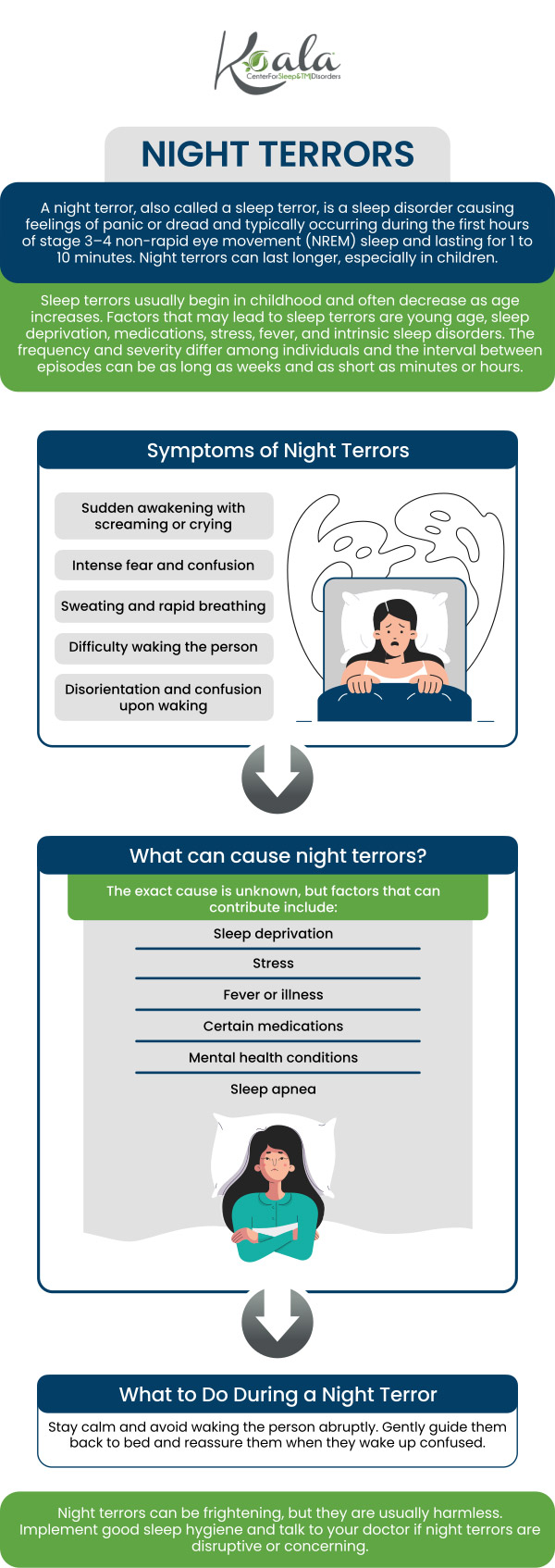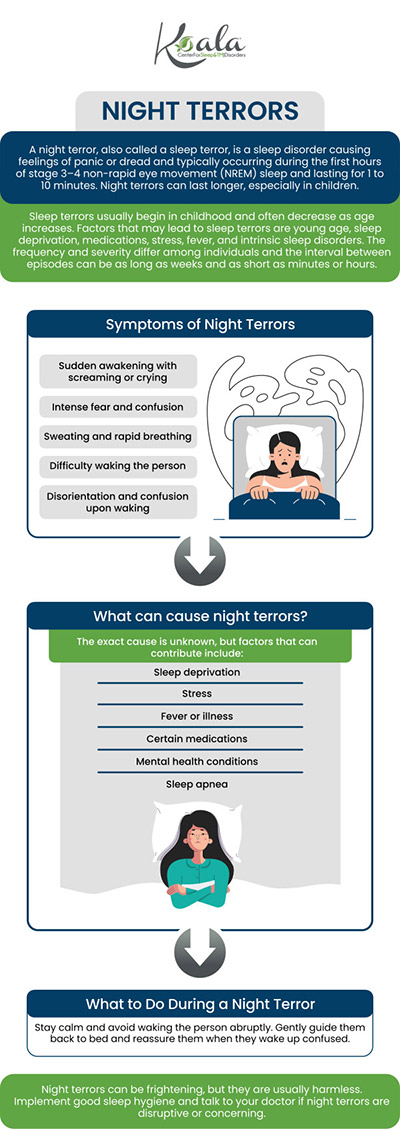Night Terrors: Causes and Tips for Prevention
Night terrors are sleep disruptions during non-rapid eye movement (NREM) sleep phases, often causing distress. They are more common in individuals with trauma, such as those with PTSD and other trauma-related psychological conditions. Come to Koala® Center For Sleep & TMJ Disorders and consult with Our professionals for night terrors. For more information, please contact us or book an appointment online now! We have convenient locations across the USA in Bloomington IL, Peoria/Dunlap IL, El Paso TX, and Wausau WI.




Table of Contents:
Are night terrors a trauma response?
What kind of trauma causes night terrors?
How long should a night terror last?
What is the best medication for night terrors?
Get help for night terrors from Koala® Center For Sleep & TMJ Disorders
Night terrors are a type of sleep disruption that typically occurs during the non-rapid eye movement (NREM) sleep phases and can be profoundly distressing. These episodes are especially prevalent among individuals who have experienced trauma. Research and clinical observations have shown that people with post-traumatic stress disorder (PTSD) and other trauma-related psychological conditions are more likely to experience night terrors.
Individuals affected by trauma-related mental health conditions often experience a heightened stress response as part of their symptoms. This stress response may not fully turn off, even while the person is asleep, leading to disruptions in the normal sleep cycle. Due to this, episodes of night terrors can occur, in which the person may scream, thrash, or panic, seemingly awake yet confused and unresponsive to efforts to comfort them. PTSD and other mental health conditions, such as depression and substance use, often cause barriers to getting quality sleep.
Various types of traumas can cause night terrors. These intense episodes of fear or panic during sleep are often connected to stress, anxiety, depression, and trauma-related conditions like PTSD. While night terrors are more commonly observed in children, adults can experience them too, particularly if there is an underlying psychological trigger.
Adults who have experienced traumatic events are at increased risk of night terrors if they also suffer from PTSD. Lifestyle factors and other health issues can exacerbate the likelihood of experiencing night terrors. Poor sleep hygiene, irregular sleep schedules, sleep deprivation, and the use of alcohol or certain medications can increase the risk of these episodes.
It’s important to understand both the triggers and the underlying causes of night terrors in order to work toward preventing them. In cases where unaddressed psychological trauma is causing night terrors, psychotherapy is highly beneficial. In addition, it’s recommended that you work with a sleep expert to create a healthy sleeping routine and manage stress to reduce the occurrence of night terrors and improve your wellness.
In most cases, night terrors last between five and ten minutes. However, the duration of night terrors varies from person to person, and these episodes may occur more than once per night. In severe cases, night terrors can last up to 45 minutes. Certain factors can make night terrors more likely, such as not getting enough sleep, being sick, having too much caffeine, or having underlying conditions like obstructive sleep apnea or PTSD.
If you or a loved one regularly experience prolonged night terrors lasting longer than 30 minutes, or if these episodes result in persistent tiredness and disruption of daily life, it’s crucial to seek guidance from a healthcare professional. A sleep expert can provide personalized strategies to address night terrors and prevent them from significantly impacting your overall wellness.
Medications are rarely used to treat night terrors, especially in children. When night terrors affect adults, a variety of treatment options may be recommended. If an adult is affected by severe or very frequent night terrors, healthcare professionals may prescribe tricyclic antidepressants, selective serotonin reuptake inhibitors (SSRIs), or low-dose benzodiazepines, such as clonazepam.
In addition to medications, sleep expert may recommend anticipatory awakening, stress management techniques, psychotherapy, or lifestyle adjustments to minimize the occurrence of night terrors. Cognitive-behavioral therapy (CBT) is a popular approach to addressing night terrors and improving sleep quality.
Furthermore, it’s recommended to create a sleep-conducive environment, have a relaxing bedtime routine, and avoid alcohol and caffeine to enhance sleep quality. With children, it’s best to avoid triggers such as stress and overstimulation close to bedtime to limit the frequency and severity of night terrors. For personalized recommendations and support, schedule a visit with one of the dedicated professionals at Koala® Center For Sleep & TMJ Disorders. Our team can assess your concerns and provide guidance on how to manage night terrors when they occur and prevent them from impacting your wellness.
At Koala® Center For Sleep & TMJ Disorders, we understand how terrifying night terrors can be, for both the person experiencing them and their loved ones. Our compassionate and experienced team is dedicated to providing effective treatment and support. We will work to identify the root cause of your night terrors, whether it’s linked to an underlying sleep disorder, stress, or other factors. By providing a personalized treatment plan, we can help reduce the frequency and intensity of these episodes, restoring peace to your nights and ensuring that you and your family feel safe and secure. Call us today to schedule your consultation with our providers.

Additional Services You May Need
▸ KoalaKIDZzz®
▸ Sleep Apnea
▸ Snoring
▸ TMJ Disorder
▸ Fatigue
▸ Sleep Disorders
▸ Weight Loss
▸ CPAP Alternative
▸ Oral Appliances




